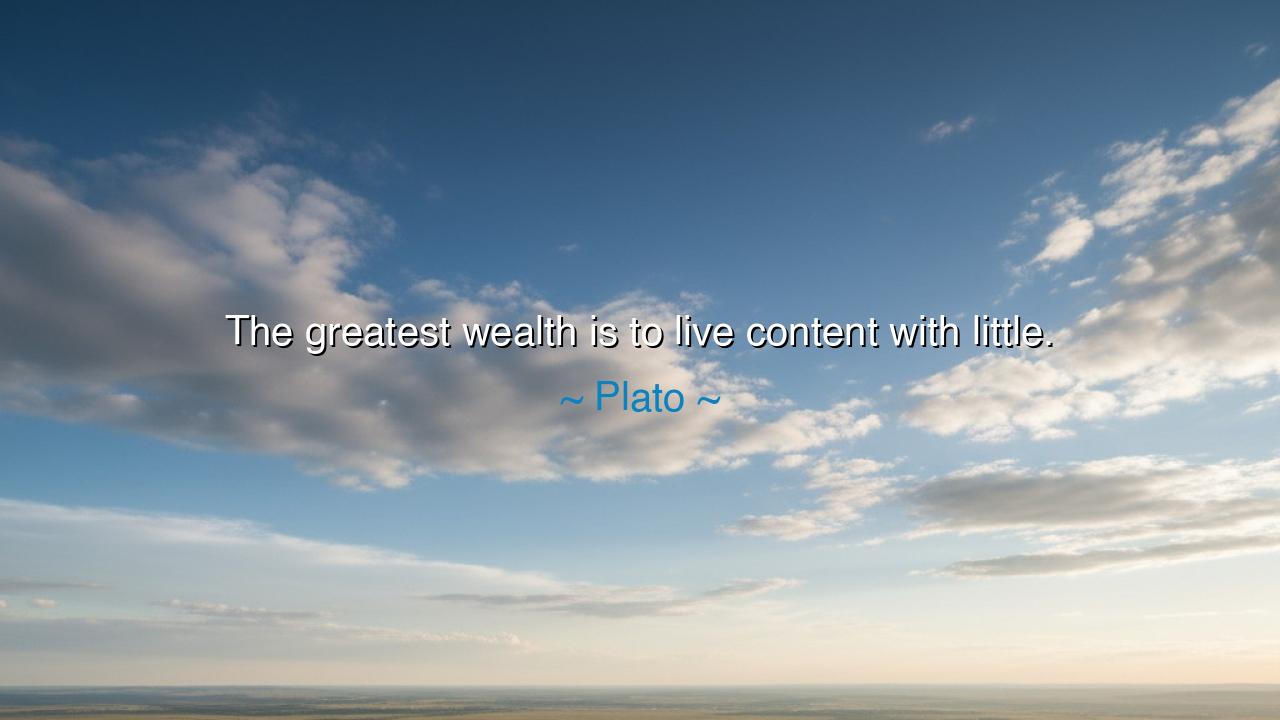
The greatest wealth is to live content with little.






“The greatest wealth is to live content with little.” — Plato.
Thus spoke Plato, the philosopher of Athens, whose words echo through the centuries like the calm wind across still water. In this simple yet eternal truth, he reveals the paradox of human desire — that true wealth is not in what one possesses, but in what one no longer needs. To be content with little is to master the self, to free the soul from the chains of craving, and to find joy not in accumulation, but in sufficiency. For the man who can live with little owns everything that truly matters: peace, freedom, and inner harmony.
The origin of this quote lies in the heart of Greek philosophy, where Plato and his teacher, Socrates, pondered the nature of happiness and virtue. In the bustling city of Athens, surrounded by merchants, politicians, and artists, they saw that men busied themselves endlessly in pursuit of gold, power, and fame — yet remained restless, unsatisfied, enslaved by their own appetites. Plato observed that the more one seeks to own, the more one becomes owned. Thus he taught that contentment, not possession, is the truest measure of wealth. The poor man who lives serenely within his means is richer than the king tormented by endless desire.
This teaching found its most vivid expression in the life of Diogenes of Sinope, the philosopher who carried Plato’s wisdom to its extreme. Diogenes owned almost nothing — he slept in a barrel, ate scraps, and mocked the pretensions of the wealthy. When Alexander the Great, the conqueror of the known world, came to see him and offered to grant him any wish, Diogenes replied simply, “Stand out of my sunlight.” The mightiest ruler on earth could offer him nothing he did not already have — for the man who is content with little cannot be conquered. His happiness is not a prize bestowed by fortune, but a fortress built within.
Yet Plato’s wisdom is not an invitation to poverty, but a call to balance. To live “content with little” does not mean to reject the world or despise its gifts, but to possess without being possessed, to use what one has without worshiping it. The man of moderation understands that enough is abundance, and that every excess becomes a burden. As the ancient Stoics later taught, happiness depends not on changing our circumstances, but on mastering our desires. He who knows contentment walks in freedom even amidst scarcity, while he who is ruled by want remains a beggar though surrounded by gold.
Consider also the example of Mahatma Gandhi, who, centuries later, embodied this Platonic truth. He owned almost nothing — a spinning wheel, a pair of sandals, a simple robe. Yet through his simplicity, he carried more power than empires. The British ruled India with armies and wealth, but Gandhi ruled hearts with humility. His strength came from his contentment, his refusal to be corrupted by greed or fear. In him we see that the one who needs little cannot be broken, for his happiness depends not on the world’s favor, but on the peace of his own soul.
Plato’s words also hold a warning for the modern age. We live surrounded by abundance, yet our hearts are empty. We have filled our homes with things and emptied our spirits of gratitude. We chase comfort and call it happiness, but comfort without contentment is nothing but gilded restlessness. The world whispers that we are poor if we lack, but wisdom whispers that we are poor only when we cannot stop wanting. The more we seek to own, the more we are owned by our seeking. Thus, the wealth of contentment remains the rarest treasure of all.
So let this be the lesson for all who seek peace: Learn to be rich by needing less. Look upon what you already have — the warmth of the sun, the laughter of a friend, the breath that fills your lungs — and know that these are riches beyond measure. Guard your heart from envy, for envy poisons joy; and from greed, for greed devours the soul. Practice gratitude each day, not as an obligation, but as liberation. For the secret of happiness lies not in adding more, but in realizing how little is truly required.
And remember Plato’s immortal truth: “The greatest wealth is to live content with little.” Seek not the treasures that fade, but the peace that endures. For kingdoms crumble, fortunes vanish, and beauty passes — but the heart that knows contentment stands unshaken. He who can say “I have enough” possesses the wealth of gods, for he carries paradise within.






AAdministratorAdministrator
Welcome, honored guests. Please leave a comment, we will respond soon